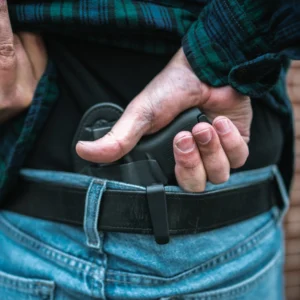In the United States, the right to bear arms is a deeply ingrained aspect of the nation’s history and culture. This right is enshrined in the Second Amendment of the U.S. Constitution, and it has led to a complex web of firearm regulations across the country. For those who choose to carry concealed weapons, understanding the intricacies of concealed carry laws is essential. As we step into 2023, it’s crucial to be up-to-date with the latest developments in concealed carry laws to ensure you are on the right side of the law while protecting yourself and your loved ones.

Concealed Carry Permits and Reciprocity
Concealed carry laws primarily fall under the jurisdiction of individual states. In the U.S., concealed carry permits are issued at the state level, and the requirements, restrictions, and processes can vary significantly from one state to another. However, there is an important concept known as “reciprocity” that affects concealed carry permit holders. Reciprocity means that some states honor the concealed carry permits issued by other states.
 As of 2023, it’s essential to research the states that honor your concealed carry permit, as well as the specific regulations governing your permit’s use. Reciprocity agreements can change over time, and while many states have reciprocal agreements in place, some states may choose to change their stance on recognizing out-of-state permits. Be aware of any updates in this regard, as ignorance of the law is not a valid defense in case of violations.
As of 2023, it’s essential to research the states that honor your concealed carry permit, as well as the specific regulations governing your permit’s use. Reciprocity agreements can change over time, and while many states have reciprocal agreements in place, some states may choose to change their stance on recognizing out-of-state permits. Be aware of any updates in this regard, as ignorance of the law is not a valid defense in case of violations.
TLDR:
- Concealed carry laws are determined at the state level in the U.S., leading to variations in permit requirements and regulations.
- “Reciprocity” is a critical concept, where some states honor concealed carry permits issued by other states.
- It’s crucial in 2023 to research which states honor your permit and understand the specific regulations associated with it.
- Reciprocity agreements can change, so staying updated is vital to avoid legal issues.
- Ignorance of changes in reciprocity agreements is not a valid defense in case of permit violations.
Constitutional Carry
Constitutional carry, often referred to as permitless carry, is a significant trend in concealed carry laws. This policy allows individuals to carry concealed firearms without the need for a state-issued permit. As of 2023, several states have adopted constitutional carry, while others are considering similar legislation.
Constitutional carry has been hailed by proponents as a move toward a more straightforward interpretation of the Second Amendment. In states that have implemented this policy, legal gun owners can carry concealed weapons without the need for extensive background checks and training. However, critics argue that constitutional carry may increase the risk of untrained individuals carrying firearms in public.
It’s essential to be aware of whether your state has adopted constitutional carry and the specific provisions that may be in place. Even in states with constitutional carry, there may still be regulations regarding the carrying of firearms in certain locations, like government buildings, schools, or private property.
TLDR:
- Constitutional carry, or permitless carry, is a growing trend in concealed carry laws as of 2023, allowing individuals to carry concealed firearms without a state-issued permit.
- Some states have adopted constitutional carry, and others are considering similar legislation.
- Supporters view it as a straightforward interpretation of the Second Amendment, eliminating the need for extensive background checks and training.
- Critics argue that constitutional carry may raise concerns about untrained individuals carrying firearms in public.
- It’s important to understand whether your state has adopted constitutional carry and any specific regulations that may apply, such as restrictions in certain locations.
Firearm Training and Safety
Regardless of whether you are in a state with strict permitting requirements or one with constitutional carry, firearm training and safety should remain a top priority. Firearm accidents can happen to anyone, and responsible gun ownership includes understanding how to handle a firearm safely.
Many states, even those with lenient concealed carry permit processes, strongly encourage or require training courses for concealed carry applicants. These courses cover essential topics like firearm safety, marksmanship, and the legal responsibilities of gun owners. It’s highly advisable to undergo such training, even if it’s not a legal requirement in your state, to ensure you have the knowledge and skills to handle your firearm responsibly.
TLDR:
- Firearm training and safety are crucial, regardless of your state’s concealed carry laws.
- Even states with lenient permitting may strongly recommend or require training for concealed carry applicants.
- Training courses cover firearm safety, marksmanship, and legal responsibilities, promoting responsible gun ownership.
- Taking such training is advisable, even if not legally mandated, to ensure you possess the necessary knowledge and skills for safe firearm handling.
- Prioritizing firearm safety is essential to prevent accidents and promote responsible gun ownership.
Federal Regulations
While most concealed carry laws are determined at the state level, there are federal regulations that apply nationwide. For example, individuals with felony convictions, restraining orders, or a history of domestic violence are prohibited from owning or possessing firearms. These federal restrictions supersede state laws, so it’s crucial to understand how they apply to you.
Additionally, the 1986 Firearm Owners Protection Act (FOPA) contains provisions that protect the rights of law-abiding gun owners during interstate travel. FOPA ensures that as long as you are in compliance with the laws of the state in which you are present, you can transport your firearms through other states that may have more restrictive regulations.
However, there are certain regulations and restrictions under FOPA that you must follow when traveling with firearms. These include keeping the firearms unloaded and locked in a case in the trunk of your vehicle or a similarly inaccessible area. Understanding these federal regulations is vital to prevent potential legal issues while traveling.
TLDR:
- Federal regulations, though concealed carry laws are mainly state-level, have nationwide applicability.
- Felons, those with restraining orders, and individuals with domestic violence history are federally prohibited from owning or possessing firearms.
- The Firearm Owners Protection Act (FOPA) safeguards the rights of law-abiding gun owners during interstate travel.
- FOPA allows transporting firearms through states with varying regulations, provided compliance with the state’s laws.
- Understanding federal regulations is essential to avoid legal issues, especially when traveling with firearms.
Changing Regulations
Concealed carry laws are not static; they can change from year to year as a result of evolving public opinion, political shifts, and high-profile incidents. 2023 is no exception to this trend, as states continue to debate and modify their concealed carry laws. For example, some states may consider implementing “red flag laws,” which allow for the temporary confiscation of firearms from individuals who are deemed a threat to themselves or others. Understanding the current political climate and proposed legislation in your state is essential to staying informed about potential changes in concealed carry laws.
TLDR:
- Concealed carry laws are subject to change due to evolving public opinion, political shifts, and notable incidents.
- In 2023, states are actively debating and altering concealed carry regulations, making it an evolving landscape.
- Some states may introduce “red flag laws” for temporary firearm confiscation from individuals seen as threats.
- Staying informed about your state’s political climate and proposed legislation is crucial to understanding potential changes in concealed carry laws.
- Adapting to these evolving regulations ensures responsible and lawful concealed carry practices.
Universal Background Checks
Another hotly debated topic in 2023 is universal background checks. Some states have already implemented stricter background check requirements for all firearm purchases, whether they are made through licensed dealers, private sales, or online transactions.
Universal background checks are seen by their proponents as a way to close potential loopholes that allow individuals with a history of violence or mental illness to obtain firearms. However, critics argue that these laws could infringe on law-abiding citizens’ rights by creating additional bureaucratic hurdles.
If you reside in a state that has implemented universal background checks or is considering doing so, it’s important to understand the requirements and procedures for obtaining a firearm legally. Additionally, if you plan to purchase a firearm privately, be aware of any legal obligations you must fulfill, such as conducting background checks through licensed dealers.
TLDR:
- Universal background checks are a contentious topic in 2023, with some states implementing stricter requirements for all firearm purchases, regardless of the source.
- Proponents view these checks as a means to close potential loopholes that may allow individuals with a violent history or mental illness to acquire firearms.
- Critics argue that universal background checks could create additional bureaucratic hurdles and infringe on the rights of law-abiding citizens.
- Residing in a state with universal background checks or considering one requires understanding the legal procedures and requirements for obtaining firearms.
- When purchasing firearms privately, individuals must be aware of any legal obligations, such as conducting background checks through licensed dealers to comply with the law.
Stand Your Ground Laws and Castle Doctrine
Stand Your Ground laws, which eliminate the duty to retreat in the face of a perceived threat, and the Castle Doctrine, which generally allows individuals to use force, including deadly force, to defend their homes, are significant components of self-defense laws.
While these laws vary from state to state, it’s essential to understand the specific provisions in your jurisdiction. Recent changes to self-defense laws may affect your rights and legal protections when using firearms to protect yourself or your property. Keep in mind that the application of these laws can be complex and may depend on the specific circumstances of a situation.
TLDR:
- Stand Your Ground laws remove the duty to retreat when perceiving a threat, and the Castle Doctrine permits the use of force, including deadly force, for home defense.
- These self-defense laws differ between states, requiring understanding of the specific provisions in your jurisdiction.
- Recent changes in self-defense laws may impact your rights and legal protections when using firearms for self-defense.
- The application of these laws can be complex, often contingent on the circumstances of a given situation.
- Staying informed and comprehending these laws is crucial for responsible gun owners to navigate self-defense situations within the bounds of the law.
Red Flag Laws and Extreme Risk Protection Orders
Red flag laws, also known as Extreme Risk Protection Orders (ERPOs), have gained attention in recent years as a response to incidents of gun violence and concerns about individuals with mental health issues or a history of violence. These laws allow for the temporary removal of firearms from individuals who are considered a risk to themselves or others.
While red flag laws can be a valuable tool for addressing potential threats, they also raise concerns about due process and the potential for abuse. It’s essential to be aware of whether your state has red flag laws, how they are implemented, and the legal protections in place to ensure a fair process.
TLDR:
- Red flag laws, also called Extreme Risk Protection Orders (ERPOs), address concerns about individuals with mental health or violent history by allowing temporary firearm removal from those deemed a risk to themselves or others.
- These laws can be valuable for addressing potential threats but raise concerns about due process and potential abuse.
- It’s crucial to know if your state has red flag laws and understand their implementation, as well as the legal protections to ensure a fair process.
- Staying informed about the specifics of red flag laws can help responsible gun owners navigate potential situations where these laws may apply.
- Balancing public safety with individual rights is at the heart of the debate surrounding red flag laws.
8 Things You Must Know [Concealed Carry Laws in 2023] Conclusion
As we navigate the complexities of concealed carry laws in 2023, staying informed and adhering to the latest regulations is crucial for responsible gun owners. Whether your state has adopted constitutional carry, strict permitting requirements, or is considering changes to its concealed carry laws, understanding the legal landscape is essential to ensure you exercise your Second Amendment rights while remaining on the right side of the law.
Remember that while the right to bear arms is a fundamental American principle, it comes with the responsibility of understanding and complying with the legal framework in place. By keeping abreast of changing laws and regulations, maintaining a commitment to safety and responsible firearm ownership, and seeking proper training, you can ensure that your right to carry concealed is exercised responsibly and safely in 2023.




